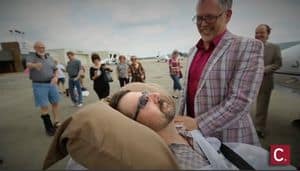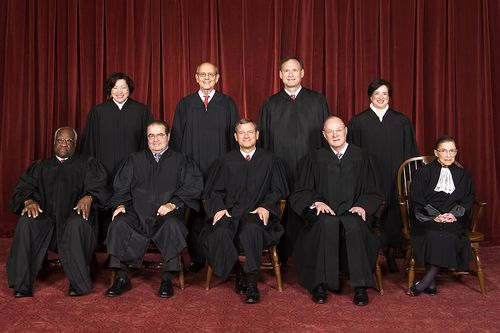On Tuesday, the Supreme Court will hear oral argument in a case called Obergefell v. Hodges. Mr. Obergefell, an Ohio man who married his late husband in a medically-equipped jet on a tarmac in Maryland, is just one plaintiff among several, bringing one case among several. But this case gives the Court the chance to make the freedom to marry a nationwide reality.
Mary Bonauto, a veteran of the LGBT equality movement and winning litigator in the Massachusetts marriage case, will argue on behalf of Michigan and Kentucky couples seeking the right to marry in their home states. Douglas Hallward-Driemeier, a former assistant solicitor general, will argue for Ohio, Kentucky, and Tennessee plaintiffs. Plaintiffs from these states married elsewhere and seek home-state recognition of their out-of-state marriage.
There are, then, two separate questions to be argued on Tuesday: (1) Does the Fourteenth Amendment allow states to ban gays from marrying? (2) Does the Fourteenth Amendment allow states to refuse to recognize valid same-sex marriages performed in other states?
Looking forward to oral arguments on Tuesday, a few underlying questions should dominate the discussion. How the Court approaches these salient issues should determine the outcome.
CONTINUED, AFTER THE JUMP…
First, should the Court decide?
 If you recall, a 2-1 majority of a panel of the Sixth Circuit Court of Appeal held that Michigan, Ohio, Kentucky, and Tennessee could ban same-sex marriage. Judge Sutton, in a decision that, I have argued, amounted to an abrogation of the judicial role, used the inapposite Baker v. Nelson to suggest that his hands were tied. A court of unelected judges, he said, should not overrule the will of the people, which had voted to ban the practice in each state. Never mind that it is indeed the role of the courts to overrule the people when the people commit grievous acts of injustice. Never mind that popular will has changed. Back in November, I wrote this:
If you recall, a 2-1 majority of a panel of the Sixth Circuit Court of Appeal held that Michigan, Ohio, Kentucky, and Tennessee could ban same-sex marriage. Judge Sutton, in a decision that, I have argued, amounted to an abrogation of the judicial role, used the inapposite Baker v. Nelson to suggest that his hands were tied. A court of unelected judges, he said, should not overrule the will of the people, which had voted to ban the practice in each state. Never mind that it is indeed the role of the courts to overrule the people when the people commit grievous acts of injustice. Never mind that popular will has changed. Back in November, I wrote this:
Judge Sutton's overriding concern, repeated a number of times during the opinion, is that it is his not his place to cut short a political process that is playing itself out in the states. Voters and elected officials are deciding what marriage laws they want and it is not for the federal judiciary or the Constitution to get in the way. He states: "Not one of the plaintiffs' theories, however, makes the case for constitutionalizing the definition of marriage and for removing the issue from the place it has been since the founding: in the hands of state voters."
Tomorrow, the Supreme Court will determine whether he's right. There are likely several justices who either sincerely believe this doctrine or are willing to hang their hats on it when it suits their views: Justice Thomas probably believes it; Justice Scalia believes it when it's convenient. Justice Alito doesn't really believe it; his opinions in countless other areas suggest no modesty whatsoever. But he would join any conservative anti-equality opinion in this case. And Chief Justice Roberts made this kind of analysis a centerpiece of his Judiciary Committee hearings.
Luckily, as we have seen in his previous LGBT law decisions, Justice Kennedy does not believe in across-the-board judicial deference to oppressors.
 Second, what right is at issue here?
Second, what right is at issue here?
On its face, this case is about gays marrying. But accepting that framing of the question accepts the legitimacy of the anti-equality narrative: this case isn't about gays marrying; this case is about marriage. The plaintiffs, gay and lesbian couples who want to marry, are not asking for a new right to get "gay married." Thinking this way is the same error the Supreme Court made in Bowers v. Hardwick, where Justice White said that the plaintiffs were looking for a constitutional right to have gay sex. Rather, the Obergefell plaintiffs are asking to be included in an institution of marriage that has a long, storied, and important history in the United States. They could win in one of two ways:
If marriage is a fundamental right, as the Supreme Court has said in 14 different cases, then states cannot so arbitrarily deny such an important right to certain citizens. Or, it's a matter of equal protection: opposite-sex couples, even those who could never biologically have children, can marry, so preventing similar gay couples from marrying is a violation of the Constitution's guarantee of equality for all persons.
Which theory the Court chooses is less important to Main Street than the end result. What's more, if Justice Kennedy writes the decision, and if his Lawrence and Windsor decisions are any indication, we are likely in store for a pretty mushy, sorta-due process, sorta-equal protection ruling that is both unclear and a little analytically frustrating.
And third, how will the Court decide?
In other words, will there be any mention of the level of scrutiny a court must bring to a situation where the state discriminates against gays? We have discussed the level of scrutiny debate for some time. Many district courts and even a couple of appellate courts decided that antigay discrimination merits some form of heightened scrutiny; indeed, the President thinks so, too. But, again, if Justice Kennedy write this opinion, it is unlikely we will get a strong statement in this regard. Plus, he probably does not need to address it given how irrational these marriage discrimination laws are anyway.
Stay tuned to Towleroad for reporting and analysis of the hearing tomorrow.
***
Follow me on Twitter.
Ari Ezra Waldman is Associate Professor of Law and the Director of the Institute for Information Law and Policy at New York Law School. He holds a Ph.D. from Columbia University, a J.D. from Harvard Law School, and a B.A. from Harvard College. Ari writes regular posts on law and various LGBT issues.




